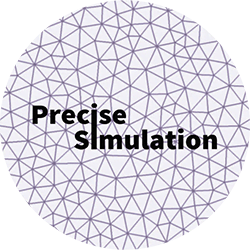
|
FEATool Multiphysics
v1.18.0
Finite Element Analysis Toolbox
|

|
FEATool Multiphysics
v1.18.0
Finite Element Analysis Toolbox
|
EX_CUSTOM_EQUATION1 1D Black-Scholes custom equation example.
[ FEA, OUT ] = EX_CUSTOM_EQUATION1( VARARGIN ) 1D Black-Scholes model equation example using the custom equation physics mode. Accepts the following property/value pairs.
Input Value/{Default} Description
-----------------------------------------------------------------------------------
icase scalar {1}/2 Test case equation to solve
tmax scalar {1} Maximum/stopping time
len scalar {1} Length of domain
hmax scalar {1/20} Grid cell size
ischeme scalar {3} Time stepping scheme
sfun string {sflag1} Finite element shape function
iplot scalar 0/{1} Plot solution (=1)
.
Output Value/(Size) Description
-----------------------------------------------------------------------------------
fea struct Problem definition struct
out struct Output struct
cOptDef = { ...
'icase', 1; ...
'tmax', 1; ...
'len', 1; ...
'hmax', 1/20; ...
'ischeme' 3; ...
'sfun', 'sflag1'; ...
'iplot', 1; ...
'dvname', 'u'; ...
'tol', 1.1e-2; ...
'fid', 1 };
[got,opt] = parseopt( cOptDef, varargin{:} );
fid = opt.fid;
% Grid generation.
nx = round( opt.len/opt.hmax );
fea.grid = linegrid( nx, 0, opt.len );
% Problem definition.
u = opt.dvname;
switch( opt.icase )
case 1
seqn = [u,''' - 1/2*',u,'x_x - ',u,'x_t + ',u,'_t = (x-t)^5 - 10*(x-t)^4 - 10*(x-t)^3'];
case 2
seqn = [u,''' - 1/2*x^2*',u,'x_x - x*',u,'x_t + ',u,'_t = (x-t)^5 - 5*(x-t)^4 - 5*x*(x-t)^4 - 10*x^2*(x-t)^3'];
end
refsol = '(x-t).^5';
init_u = 'x^5';
% Set up problem struct.
fea.sdim = { 'x' };
fea = addphys( fea, @customeqn );
fea.phys.ce.dvar = { u };
fea.phys.ce.eqn.seqn = seqn;
fea.phys.ce.sfun = { opt.sfun };
% Dirichlet BCs for the left and right boundaries.
fea.phys.ce.bdr.coef{1,5} = { 1 1 };
fea.phys.ce.bdr.coef{1,7} = { '-t^5' ['(',num2str(opt.len),'-t)^5'] };
% Check and parse problem struct.
fea = parsephys( fea );
fea = parseprob( fea );
% Call to time-dependent solver.
[fea.sol.u,tlist] = solvetime( fea, 'fid', fid, ...
'tmax', opt.tmax, ...
'init', init_u, ...
'icub', 6, ...
'ischeme', opt.ischeme, ...
'tstep', opt.tmax/100);
% Postprocessing.
fea.sol.t = tlist(end);
fea.sol.u = fea.sol.u(:,end);
refsol = strrep( refsol, 't', num2str(fea.sol.t) );
if( opt.iplot>0 )
figure
postplot( fea, 'surfexpr', u, 'axequal', 'off', 'linewidth', 2 )
title( ['Solution at time ',num2str(fea.sol.t)] )
hold on
x = linspace(0,opt.len,25);
u_ref = eval(refsol);
plot( x, u_ref, 'r--' )
end
% Error checking.
err = evalexpr( ['abs(',refsol,'-',u,')'], linspace(0,opt.len,10), fea );
err = norm(err);
if( ~isempty(fid) )
fprintf(fid,'\nL2 Error: %f\n',err)
fprintf(fid,'\n\n')
end
out.err = err;
out.pass = out.err<opt.tol;
if ( nargout==0 )
clear fea out
end